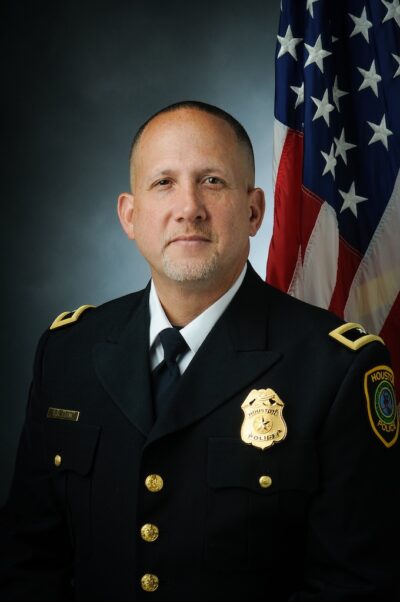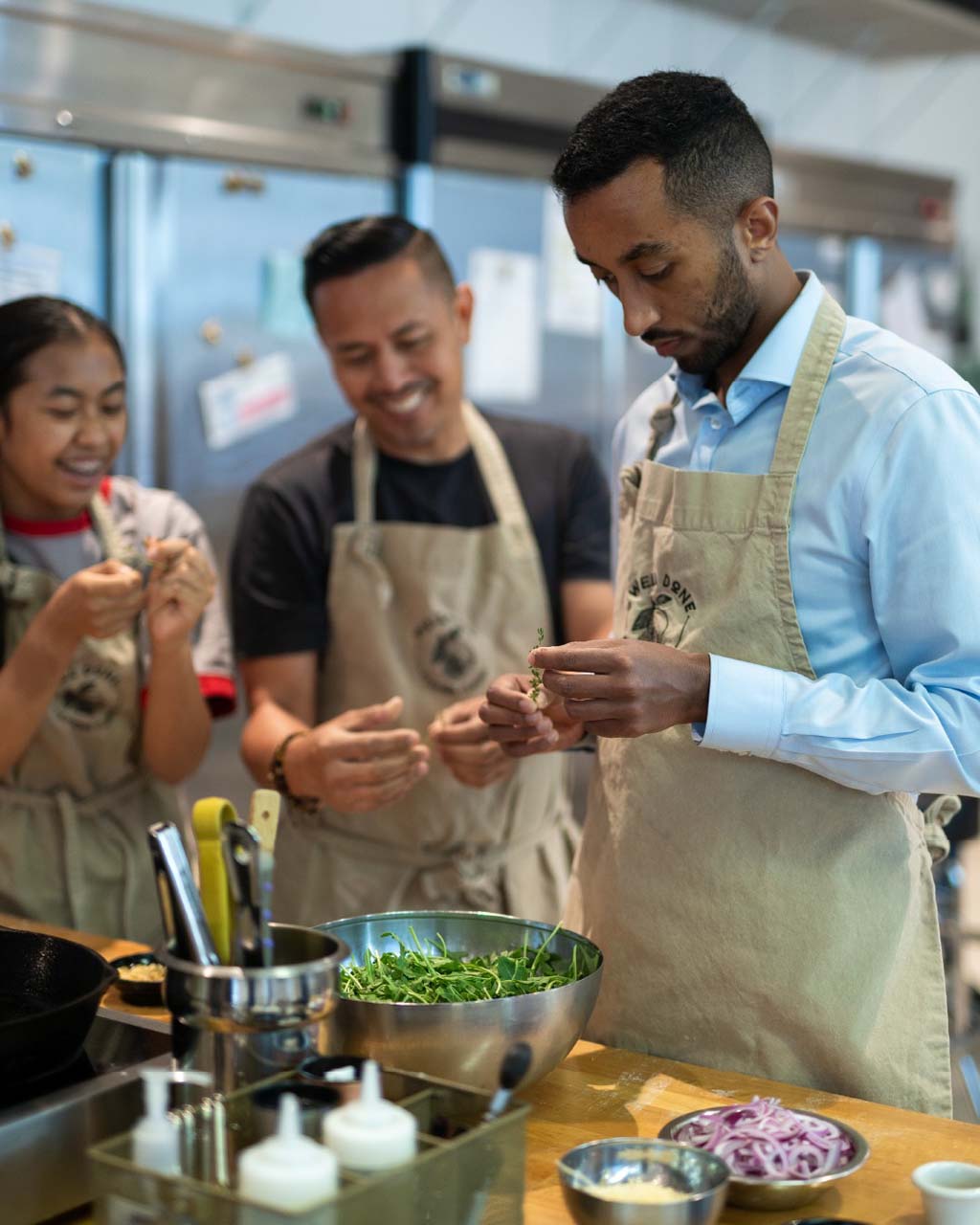 Houston Police Department Commander Ray Leon oversees the Northwest Command, which serves the Spring Branch Management District and communities nearby.
Houston Police Department Commander Ray Leon oversees the Northwest Command, which serves the Spring Branch Management District and communities nearby.
We spoke with Commander Leon about his officers, his goals and his focus on community engagement.
Q: You were born and raised in Houston. Tell us a little about yourself.
A: I was born and raised in Houston’s Denver Harbor neighborhood. I attended HISD schools and graduated from Lamar High School, and I enlisted in the United States Navy after graduation.
Q: What led you to law enforcement?
A: My brother-in-law was in the HPD Academy and he would talk about some of the training he was going through. It really began to interest me. After I left the military, I enrolled in the academy and began my career with HPD in 1996. I started at the Northeast Substation and worked at a few different patrol stations before going to the Homicide Division. I promoted to sergeant in October of 2009, then went back to patrol. I also worked as a child abuse cases supervisor before promoting to lieutenant in December of 2014. In April of this year, I was promoted to commander and assigned to the Northwest Division.
Q: What were some of your goals coming into your new role? How have you addressed reaching those goals?
A: Commander Leon: Community engagement was always one of the biggest things that I have wanted to do. I have the desire to serve and include the community as much as possible. The truth is we cannot do our jobs without community involvement. If you don’t have citizens willing to report crimes and be witnesses to crimes, it makes it that much harder to do our jobs.
We’ve done Coffee with the Cop events and also Thanksgiving meal giveaways. Giving back is one of the best things that we can do because these outreach events humanize our police officers to citizens. I tell my officers if you are only interacting with citizens when they call for help, you are kind of missing the point of what policing is about. My biggest goal was to increase community involvement and in addition to that, making working conditions for my officers as good as possible. That includes making sure our station is in good shape, that we have good equipment to work with, and creating an atmosphere where they want to come to work. These were my two biggest goals coming in.
Q: How many officers do you have under your command at Northwest?
A: I have a total of 128 officers, 24 sergeants, and 5 lieutenants. You have different teams within your command, tell us about those.
Q: You oversee multiple teams of officers. Please tell us about them.
A: We have a Differential Response Team (DRT). This team works on homeless encampments and abating those camps as we find them or citizens report them.
They also do site visits on any business to ensure they are in compliance with the law. This includes things like eight-liners (gambling machines), permitting issues, and other quality-of-life issues.
Second, we have a Crime Suppression Team (CST). This team targets violent crimes, as well as hot spot areas. They also do gang investigations and other crimes such as jugging, which is one issue the CST is focused on in our area. Jugging, for example, is when you go to the bank and take out money, and then you go to a store and leave your money bag in your car. Someone will break your window and take the money bag or look for the money bag. Sometimes those cases even turn into robberies, which are inherently dangerous. The CST is more of a specialized unit whereas our patrol officers are more call-for-service oriented.
Q: What are some things that community members, business owners, and residents that we can do to help reduce crime in our area?
A: This is part of the responsibility of our DRT. They go out to businesses, and we also do monthly Positive Interaction Program meetings. Basically, talking to businesses and citizens about how to make their businesses what we call a hard-target. That includes security videos that can record and that are high-definition quality. We talk about alarm systems, making sure that they have functioning gates, walk-in gates or drive-in gates. This also translates to citizens because we teach them how to make their homes a hard target. It’s about making sure you have sufficient exterior lighting, that you have a good home alarm system with quality video. We also ask that businesses and citizens quickly report crimes, and get evidence (video, etc.) to us as fast as possible. We are able to work those cases and solve them using that evidence and investigative methods.
We can always use more community engagement. We would love to have businesses and community organizations, civic groups, HOA’s, or anyone who would want to partner with us to contact us. The more we communicate, the more we are involved with each other. I think it reduces crime overall and improves our quality of life. I am getting my officers more involved, and they are excited about it.
Q: We hear a lot about safety during the holidays but this is great advice even after the holidays. What are things that we can do when we are out shopping or doing errands?
A: If you go shopping at a store, buy some items and put them in your car, please do not go to another store to buy more items. Take that stuff home first because there are criminals who will follow you around, and they will steal what you have bought as soon as you leave your vehicle unattended.
You must also be more aware of your surroundings. We teach what you can do to not look like a victim. Walking from a store to your vehicle with your head down gives the impression that you are not paying attention to your surroundings, and you look like you are not aware of what is going on. You become an easy target. We tell people to make eye contact with confidence and look like you are paying attention to what is going on.
Q: You talked about securing our home but what about when we are going to be gone for an extended period, maybe on a business trip or vacation?
A: Securing a home when you are on vacation is actually something you can do, but we can help with that as well. We have something called Alert Slips. Alert Slips can be used by anybody, business or a citizen. You can call your local police station, or you can also go online to the houstonpolice.org website and find the Alert Slip. The request lasts for two weeks and can be renewed indefinitely. You can fill out an Alert Slip with the dates you will be away from home. We will assign an officer on all three shifts to the alert slip, and they are then required to go out and check on your home three times a day for the assigned period.
Q: How important is it to call the police to make reports for things taking place in our communities?
A: We are a very data-driven agency. If you saw someone break into your car but you chased them off and they didn’t steal anything, report it to us anyway. We look at these statistics to determine if we have a problem area or see a trend that needs to be addressed. I use these statistics to deploy resources to an area, so crime reporting is very important. So, no matter what it is, even if you think it is nothing, a lot of times it is. For non-emergencies, the number is 713-884-3131.
— by Jessika Leal





